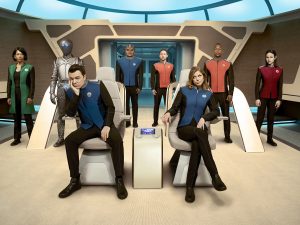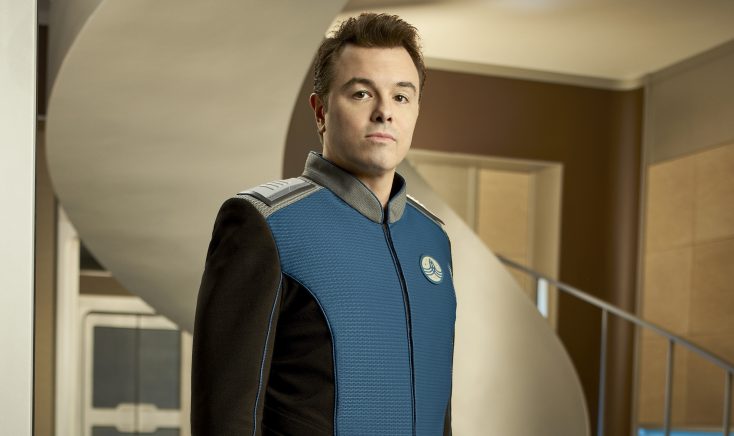
(l-r) Penny Johnson Jerald, Mark Jackson, Seth MacFarlane, Peter Macon, Scott Grimes, Adrianne Palicki, J. Lee and Halston Sage in THE ORVILLE. ©2017 Fox Broadcasting Co. Cr: Noah Schutz/FOX
By JUDY SLOANE
Front Row Features
HOLLYWOOD—Seth MacFarlane (“Ted, “Family Guy”), creator/writer/executive producer and star of Fox’s “The Orville,” wants viewers to know the series is not a spoof of the classic sci-fi series “Star Trek,” but it is an homage to the franchise.
The live-action space adventure, set 400 years in the future, follows the U.S.S. Orville, a mid-level exploratory spaceship. The crew is made up of both humans and aliens, under the command of Captain Ed Mercer (MacFarlane). The series also stars Penny Johnson Jerald (“The Larry Sanders Show”), Adrianne Palicki (“Agents of S.H.I.E.L.D.”), Scott Grimes (“NCIS: Los Angeles”) and Peter Macon (“Shameless”).
The series premieres Sunday Sept. 10 at 8 p.m./7c. The charismatic MacFarlane spoke about his newest venture at the TV Critics tour.
Q: Fox is advertising this very heavily as a comedy and not so much as the very sincere homage it is. Do you have any concerns about how viewers are being brought to your show?
MacFarlane: That thought has crossed my mind. The promos have leaned very heavily on the comedy and the comedy is a significant part of this. But I feel great about the shows we’ve done, and I feel like—tonally—they’re going to speak for themselves. Once people tune in and see what the hour has to offer, it’s really going to become clear what the show is.
Q: In some moments, the show seems to be a satire. In other moments, it feels like you’re watching a story that could have been a “Star Trek: The Next Generation” script. What are you trying to do?
MacFarlane: Because we’re an hour‑long show, the story has to come first. And it can’t just be gag, gag, gag. There has to be some reality to where the comedy comes from, and where the jokes come and how they kind of lay out. You’ll notice that there really isn’t anything that exists in the “Spaceballs” or “Family Guy” realm. It’s all things that come out of who the characters are or that adhere to the reality of a science‑fiction world.
Q: “Galaxy Quest” was a good spoof but yet had a good story. Was that an influence on you when it came to this show?
MacFarlane: Shockingly, no.
Q: Did you see that film?
MacFarlane: I have, yeah. I saw it once years ago, but shockingly, it wasn’t. The intent of that movie, to me, was to be a full‑on comedy and, as a result, the stakes, in terms of science fiction and the parables of science fiction, weren’t really something that needed to be taken all that seriously because it was pure comedy.
Q: You’ve got a number of “Star Trek” alumni working on this show. How do you define your relationship with “Star Trek,” especially “The Next Generation” and the era that your show definitely seems to have a kinship?
MacFarlane: There are two ways to answer that. One, “Star Trek” itself sprang from a lot of different sci‑fi tropes that came before it, from sci‑fi radio dramas in the ’30s and serials. The idea of a ship in the naval sense cruising through space is something that doesn’t originate with (“Star Trek”). They were the ones who really crystalized it in a more perfect way than anyone else. There are many different places that I draw from when I think about this. There’s “The Twilight Zone.” I hold a lot of these different franchises in very high regard. I miss (seeing on television today) the forward‑thinking, aspirational, optimistic place in science fiction that “Star Trek” used to occupy.
They’ve chosen to go in a different direction, which has worked very well for them in recent years. But what has happened is that it’s left open a space that has been relatively unoccupied for a while in the genre. It’s a space that’s waiting to be filled in this day and age when we’re getting a lot of dystopian science fiction. A lot of it is great and very entertaining, but it can’t all be “The Hunger Games.” It can’t all be the nightmare scenario.
Q: Can you talk a little bit about the hiring of “Star Trek” alumni, including Executive Producer Brannon Braga, especially directors like (“Star Trek” TV series actors) Robert Duncan McNeill and Jonathan Frakes?
MacFarlane: It’s exciting. It’s thrilling. I love it. I’m having the time of my life working with these people. I remember being in college and being a fan of Brannon’s work. Obviously, with Frakes and Robbie McNeill, I knew their work and I was a fan. So, to be now working with these people on a day‑to‑day basis on a show like this, is nothing short of a joy.
Q: Do you feel it’s to your advantage or your disadvantage that a new TV iteration of “Star Trek” is coming along at pretty much the same time you are?
MacFarlane: From what I’ve seen and what I’ve read, they couldn’t be more different. Again, they’re kind of continuing in the new direction that they’ve chosen to go with that franchise, and we’re doing something a little more old-school.
Q: When creating this series, were you focused more on the audience or the space in television that it could fill?
MacFarlane: A little of both. I always go into a project, to some degree, with the thought of, “Okay, what would I want to see? What’s missing for me in television or in film?” I’m aware that there is a desire for this kind of science fiction, at least in a certain segment of the audience, and I’m part of that. I look at it in terms of what’s going to make a great show, what’s going to surprise people and, if I were an audience member, what would I want to watch? When I think of the shows that I love—”The Twilight Zone,” “Star Trek” and even comedy shows like “All in the Family”—that element that is consistent throughout is surprise. If you can surprise your audience, and if they can turn on their TV and really not know what it is they’re going to see that week, you can tell any kind of story you want. That, to me, is a show that I want to watch.
“The Orville” premieres on Fox Sunday Sept. 10 at 8 p.m./7c.





